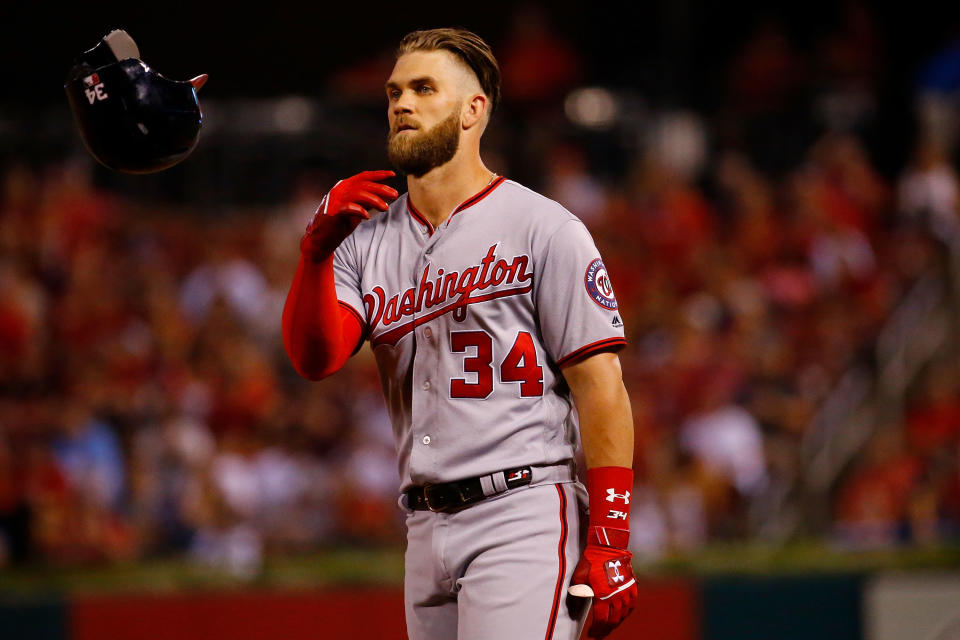The failure of the Bryce Harper Era
Washington Nationals owner Mark Lerner wrote an open letter to fans Tuesday and, like the Nationals’ season, it didn’t make much sense. In it, Lerner tried to rationalize trading Daniel Murphy to the Chicago Cubs for a fringe prospect and allowing the St. Louis Cardinals to claim Matt Adams via waivers Tuesday as some sort of an indication that because this incarnation of the Nationals was an unadulterated disappointment, shipping off two free agents-to-be represented a pivot toward the future.
The truth, according to a source familiar with the transactions that will save the Nationals a bit more than $5 million: “It was a money dump. Plain and simple.”
Between talking about how “the actions we are taking now will strengthen the franchise and keep us in the position of being a perennial contender” and shouting out general manager Mike Rizzo while not bothering to mention manager Dave Martinez by name, Lerner saw the abnormality of the Nationals’ 2018 season and happily raised it. Every day, it seems, brings a new twist to a team that entered the season with championship aspirations and finally brandished the white flag Tuesday, with 125 games of sub-.500 baseball under their belts.
Arguably the most talented collection of players in the National League never figured out how to be a winning team, and its slow dissolution began by jettisoning Murphy and Adams. The Nationals did pull Bryce Harper off waivers after the Los Angeles Dodgers claimed him, ensuring he will spend the last six weeks of the season with the team that drafted him, developed him and in seven seasons didn’t win a playoff series with him.

Tuesday wasn’t just funereal with regards to the 2018 season. It emphasized the failure of the Nationals writ large – how an onerous ownership group begat a managerial carousel that consistently put players in bad positions. Some of this is on the players, of course, as they didn’t perform in October, but when Yahoo Sports reported before the July 31 deadline that the Nationals clubhouse was a “mess,” it was a manifestation of the many issues that trouble the organization.
Which is not altogether uncommon. There are other hands-on owners, other overwhelmed managers, other players who shrink. There may not be another general manager who would trade a player because he falsely believed him to be a source in a critical story, but then Rizzo is one of a kind and Brandon Kintzler is headed to the playoffs with the Cubs, so there’s that.
The ills that plague the Nationals are more bacterial than viral, solvable so long as the proper prescription is handed out. There can be, as Lerner alluded to in his letter, a bright future in Washington. Max Scherzer is under contract long-term. Juan Soto is a star. Anthony Rendon is around for another year. Trea Turner is the shortstop of the present and future. Stephen Strasburg, when healthy, is a solid No. 2 starter. Adam Eaton is a nice part of any core. Victor Robles is on the come. There are pieces.
Then again, there were pieces this year, and the present is grim. The easiest target is Martinez, a first-year manager whose fortunes pale next to his neophyte contemporaries: the Red Sox’s Alex Cora, the Yankees’ Aaron Boone and the Phillies’ Gabe Kapler. Even worse for Martinez is that the man he replaced, Dusty Baker, had won a pair of division titles, gone 192-132 and engendered great faith among players in his two seasons with the Nationals. As one person who values managerial dynamics put it: “Managers are generally overrated until they aren’t. On teams with big stars, the manager needs to be better than most, bigger than most, more skilled than most or those stars only shine for themselves.”

And … that more or less encapsulates the Nationals. There is at least some level of discord in most clubhouses. As it has brewed inside the Nationals’, sources said, Martinez has not addressed it in meaningful or substantive fashion. A large swath of players are unhappy, and not just because of Washington’s record. And Rizzo’s apparent belief that this could be allayed by dealing Kintzler and reliever Shawn Kelley, one source said, “showed that he doesn’t know this clubhouse as well as he thinks he does.”
What this means for Harper’s future is unclear. He will hit free agency when the postseason ends and chase the largest contract in professional sports history. He was confused when the Nationals discussed trading him before July 31 because he assumed they wanted him back. With a potential Soto-Robles-Eaton outfield, they don’t necessarily need him, not at $30 million-plus a year when they’ve got other players to consider signing long-term. And their decision not to deal Harper may not reflect their desire to keep him; maybe the potential first-round pick they would receive if he leaves in free agency simply was more valuable than anything the Dodgers were offering.
The Martinez conversation, the Harper conversation – those are legitimate looks toward the future, hard questions Washington needs to answer. Tuesday wasn’t that. It was an acknowledgment that the Nationals had failed, that the Harper Era would be seen as one that brought baseball back in Washington while delivering it the same sort of fate the city has long known: one in which the biggest W they saw was on the players’ hats.
More from Yahoo Sports:
• Elway triggers harsh response from Kaepernick’s lawyer
• Only the Mets could lose in such an embarrassing way
• Ravens rookie QB may not be ready for the NFL – yet
• MLB star apologizes to ESPN over ‘fake news’ claim


